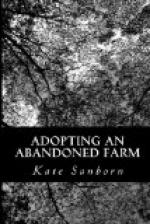That opinion of my earnest efforts to effect a renaissance at Gooseville—to show how a happy farm home should look to the passer-by—in short, my struggle to “live up to” the peacocks revealed, as does a lightning flash on a dark night, much that I had not perceived. I had made as great a mistake as the farmer who abjures flowers and despises “fixin’ up.”
The pendulum of emotion swung as far back, and I almost disliked the innocent cause of my decorative folly. I began to look over my accounts, to study my check books, to do some big sums in addition, and it made me even more depressed. Result of these mental exercises as follows: Rent, $40 per year; incidental expenses to date, $5,713.85. Was there any good in this silly investment of mine? Well, if it came to the very worst, I could kill the couple and have a rare dish. Yet Horace did not think its flesh equal to an ordinary chicken. He wrote:
I shall ne’er prevail
To make our men of taste a pullet choose,
And the gay peacock with its train refuse.
For the rare bird at mighty price is sold,
And lo! What wonders from its tail
unfold!
But can these whims a higher gusto raise
Unless you eat the plumage that you praise?
Or do its glories when ’tis boiled
remain?
No; ’tis the unequaled beauty of
its train,
Deludes your eye and charms you to the
feast,
For hens and peacocks are alike in taste.
Then peacocks have been made useful in a medicinal way. The doctors once prescribed peacock broth for pleurisy, peacocks’ tongues for epilepsy, peacocks’ fat for colic, peacocks’ galls for weak eyes, peahens’ eggs for gout.
It is always darkest just before dawn, and only a week from that humiliating Sunday episode I was called by my gardener to look at the dearest little brown something that was darting about in the poultry yard. It was a baby peacock, only one day old. He got out of the nest in some way, and preferred to take care of himself. How independent, how captivating he was! As not one other egg had hatched, he was lamentably, desperately alone, with dangers on every side, “homeless and orphanless.” Something on that Sabbath morning recalled Melchizedec, the priest without father or mother, of royal descent, and of great length of days. Earnestly hoping for longevity for this feathered mite of princely birth, I called him “Melchizedec.”
I caught him and was in his toils. He was a tiny tyrant; I was but a slave, an attendant, a nurse, a night-watcher. Completely under his claw!
No more work, no more leisure, no more music or tennis; my life career, my sphere, was definitely settled. I was Kizzie’s attendant—nothing more. People have cared for rather odd pets, as the leeches tamed and trained by Lord Erskine; others have been deeply interested in toads, crickets, mice, lizards, alligators, tortoises, and monkeys. Wolsey was on familiar terms with a venerable carp; Clive owned a pet tortoise; Sir John Lubbock contrived to win the affections of a Syrian wasp; Charles Dudley Warner devoted an entire article in the Atlantic Monthly to the praises of his cat Calvin; but did you ever hear of a peacock as a household pet?




